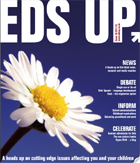
click above to browse
through
the current issue


Want to see your child's
work in print? The winner
will receive a �25 book voucher.
Email:
[email protected]
THE GREAT TV DEBATE CONTINUES!
The Freeview research report “Viewtrition”, which came out in
November, has continued to show that 8 out of 10 parents still
believe that television has a positive effect on their children’s
development. This runs contrary to much of the current research
by many medical experts.
The American Journal of Preventative Medicine found that, in a
study of older children, those youngsters who spent several hours
watching TV or using a computer were found to be significantly
less fit and healthy than those who did not.
In another study by Professor Christakis of the University of
Washington in Seattle, it was found that children who watched a
lot of television as toddlers did not perform as well on tests to
check reading and memory skills.
Fiona Macrae, writing in the Daily Mail, quotes the Professor’s real
fears for infants who are put in front of the TV: “The weight of
existing evidence suggests the potential for harm and I believe that
parents should exercise due caution in exposing infants to
excessive media.”
There are a growing number of educationalists and medics who
worry about what Professor Christakis sees as the “negative effect”
television has by exposing “children to flashing lights and quick scene
changes that can over stimulate the developing brain.” This worry has
led to many head teachers advising parents not to allow children to
watch television or computer screens just before going to bed.
Exposing “children to flashing lights and
quick scene changes can over stimulate the
developing brain”
Ms Macrae also warns parents of Professor Christakis’ advice, to
exercise extreme caution when using “educational dvds such as
‘Baby Einstein’ and ‘Brainy Baby’” because there is “no scientific
evidence that these are effective.” Interestingly, she notes: “In
response to litigation, ‘Baby Einstein’ has recently modified its
claims and de-emphasised the educational components.”
Dr Tanya Byron, writing in the Freeview – Viewtrition parent’s “guide
to quality TV for kids,” says that it is important to teach “your little
ones to become discerning and healthy TV viewers and to balance
time watching the television against time spent in other healthy and
enriching activities.” Her main message seems to be: “Television is
best enjoyed and has greatest impact when shared and discussed.”
The debate continues . . .
|

